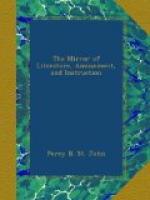[13] Amongst other interpretations of “Under the Rose,” why may we not conjecture that it may have something to do with bribes to silence? with hush-money? the Rose, in many countries, being not an unusual stamp on their coins.
After this erudite disquisition, which endeavours to account for the smallness of the sum for which our blessed Lord was betrayed, and for which Alcedama was purchased, how would honest Andrew Favine stare, could he learn that modern commentators have, without comment, assigned something less than one-fifth of 18_l_. 7_s_. 6_d_. as the “price of innocent blood.” We transcribe in proof, the annotation on Mat. 26 c. 15 v. from D’Oyly and Mant’s Bible:—“‘Thirty pieces of silver.’ Thirty shekels, about 3_l_. 10_s_. 8_d_. of our money. It appears from Exod. 21 c. 32 v., that this was the price to be paid for a slave or servant, when killed by a beast. So vilely was HE esteemed, who shed his precious blood for man; and so true it is, that Christ took upon him the form of a servant.” Now, the Jewish shekel being valued at 2_s_. 4-1/4_d_. and the coin of the next superior denomination, (the maneh) being set down in our Bible money-tables, at 7_l_. 1_s_. 5_d_. it is clear that several of intermediate value must have existed, for exchange, which might reconcile this difference. M.L.B.
* * * * *
THE PUBLIC JOURNALS.
* * * * *
PORTDOWN FAIR.
[A series of characteristic sketches of Life in the Navy, has appeared in the successive numbers of the Metropolitan, from the pen of Captain Marryatt, author of the King’s Own, and other popular novels, with a high stamp of originality. The sketches before us are entitled Peter Simple, and detail the early adventures of a Middy with much of that delightful ease we are wont to admire in the writings of Smollett, Fielding, and the character novelists of the latter half of the past century. The style of Captain Marryatt is fresh, vigorous, and racy—“native and to the manner born,”—abounding in lively anecdote, but never straying into caricature—with just enough of the romance of life to keep the incidents afloat from commonplace, and probability above-board. This and the following are specimen sketches.]
We all had leave from the first lieutenant to go to Portdown fair, but he would only allow the oldsters to sleep on shore. We anticipated so much pleasure from our excursion, that some of us were up, and went away in the boat sent for fresh beef. This was very foolish. There were no carriages to take us to the fair, nor indeed any fair so early in the morning: the shops were all shut, and the Blue Posts, where we always rendezvoused was hardly open. We waited there in the coffee-room, until we were




